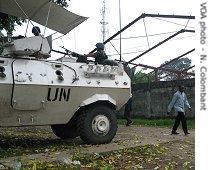2007年VOA标准英语-UN Evaluates Africa's Post-Conflict Disarmament(在线收听)
Dakar
13 June 2007
United Nations officials and delegates from about 20 African nations are meeting in Kinshasa to talk about disarmament strategies that can be implemented when conflicts come to an end. Analysts say the session will be provide a useful platform for delegates from across Africa to exchange information on disarmament, but say it is important that the U.N. does not dominate a process that must be driven by Africans themselves. Selah Hennessy reports from our West and Central Africa bureau in Dakar.
 |
| UN armored vehicle in Kinshasa (2006 photo) |
Organizers say they want to facilitate communication between officials from countries that have already gone through the process, like Mozambique and Sierra Leone, and those that are just beginning, such as in divided Ivory Coast.
Observers say it is significant that the conference is taking place in the Democratic Republic of Congo, which is currently working towards disarmament following a drawn-out civil war.
Opening the conference, the DRC Foreign Minister Antipas Mbusa Nyamwisi, said that over 100,000 former combatants have been disarmed in his country, including at least 30,000 child soldiers. But he said there is still much to be done.
Some aid workers say thousands of former fighters in the DRC still need to be disarmed or reintegrated into a newly formed army.
Alex Vines is from the London-based research center Chatham House. He says conferences such as these, where delegates from across Africa share experiences and information, are very important.
He says that it is necessary to have a consistent approach to disarmament, especially when dealing with countries that neighbor one another. Vines says there are often noticeable differences, such as the amount of money given to fighters who enter the process.
"I remember that the disarmament package being offered in Liberia was much less than the one that was going to be offered in Cote d'Ivoire, which meant for example that ex-combatants were waiting to hand their weapons over in Cote d'Ivoire because they get more money for it," he said. "These are the types of lessons that need to be learned."
Emmanuel Sowatey, a researcher with the Ghana-based non-profit organization Africa Security Dialogue and Research, says the conference will be beneficial, but may not lead to any concrete change.
"It is sometimes very difficult to make prognosis based on these conferences, particularly if no actionable policy is being implemented," he said. "Time and again we see this type of workshop and conferences, but the real, for me, fulcrum of the issue is seeing the actionable policies being implemented."
Sowatey says the U.N. presence in Africa is beneficial to the continent, especially in terms of financial support.
But he says it is important that the international body does not always take the lead role in decision making, and that local perspectives are respected and incorporated into policy planning, including in how to manage the delicate period of disarmament and reintegration.